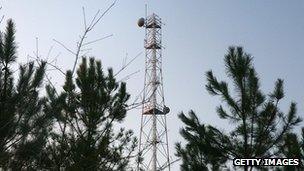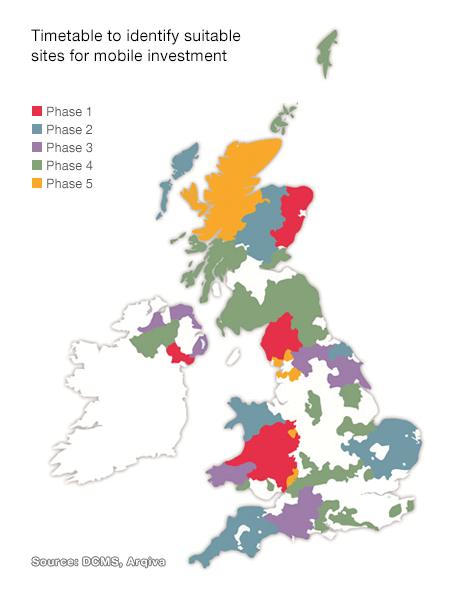End to mobile phone black spots in mid Wales 'good news'
- Published

Government funding will be used to buy the right to erect masts on various properties
Plans to extend mobile phone coverage to rural mid Wales will make a "real difference" to people living and working there, politicians say.
Powys and Ceredigion will be among the first UK areas to benefit from the UK government's plan to end mobile black spots at 60,000 homes and businesses.
Montgomeryshire AM Russell George and MP Glyn Davies said it would help communities and local economies.
The first of the new sites could "go live" by the end of this year.
A total of £150m has been set aside for the Mobile Infrastructure Project (MIP), which was first announced in October 2011.
The UK government has given more details, including naming which parts of the country will share the cash and in what order.
Mr Davies said the announcement that mid Wales would be among the first areas to benefit from the scheme was "good news".
"This project will see mobile phone coverage extended to areas of rural Powys where currently none exists," he said.
"It will also provide a significant boost to local economies across the region and allow people to do business in a much easier way."
Mr George, chair of the National Assembly's cross party group on digital communication, said: "Wales has tended to be well behind the UK curve when it comes to the development of digital communications infrastructure and we continue to play catch-up, which certainly hasn't helped our general economic performance.
"We desperately need to strengthen and enhance our digital infrastructure if we are going to ensure our rural communities are viable places to live and work in the future."
Identifying sites
The government funding will be used to buy the right to erect masts on properties and pay for the infrastructure.
The equipment will then be used by network operators Vodafone, EE, O2 and Three.
The scheme has been divided into five phases, the first two of which are already under way.
The UK government said efforts to identify sites for new masts are already under way in much of Wales, Lancashire and Aberdeenshire.
The Scottish Highlands are among areas where the work will be completed last.
A map showing which areas are being given priority by communications infrastructure company Arqiva - which is running the project - has been published by the Department for Culture Media and Sport (DCMS).

- Published30 July 2013
- Published5 July 2013
- Published28 June 2013